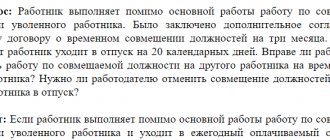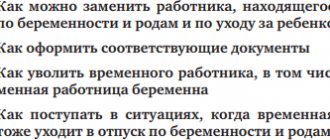Replacing a temporarily absent employee may be required at an enterprise in various situations. For example, such a need arises in the event of an employee’s vacation or illness, if he performs important functions without which the enterprise cannot function (work on a machine, continuous production, etc.). In other positions, replacement is usually resorted to when going on maternity leave.
- What is substitution
- When is a replacement issued?
- Replacement by another employee Is it possible to refuse replacement?
- How to register correctly
- Sample documents
Performing the duties of a temporarily absent employee
There are several ways to replace vacationers:
- Combination. The employee combines his own work and the work of a vacationer (Article 60.2 of the Labor Code of the Russian Federation).
- Temporary transfer. The employee performs only the duties of a vacationer (Article 72.2 of the Labor Code of the Russian Federation).
- Part-time job. The employee spends time free from his main job on vacation work (Article 60.1 of the Labor Code of the Russian Federation).
- Hiring a temporary employee. An employee is hired with the conclusion of a fixed-term contract for a period corresponding to the vacation period of the replaced employee (Article 59 of the Labor Code of the Russian Federation).
Reasons for introducing substitution
According to the Labor Code of the Russian Federation, all full-time employees have the right to equal pay and work, rest, and other additional guarantees. The following reasons are considered legal grounds for absence from work:
- Medical indications, or the need to obtain any special permits.
- Execution of government duties. An example is when they take part in military training.
- Advanced training, if management has previously issued a corresponding order.
- Training according to the schedule established by the institution.
- Illnesses, including pregnancy and childbirth.
- Business trip destination.
- Annual or administrative leave.
Expansion of responsibilities or combination
If one employee goes on vacation, another may be assigned to perform his duties without releasing him from his main job. This work may correspond to his position or not (Article 60.2 of the Labor Code of the Russian Federation).
If the additional work is similar to the employee’s work, this is an expansion of responsibilities; if not, it is a combination.
Is a full-time deputy manager entitled to additional payment if the manager goes on vacation and his responsibilities are assigned to the full-time deputy? The answer to the question is debatable, because according to the official duties of the deputy. must “pick up” the manager’s affairs during his absence. Find out the authoritative opinion of a ConsultantPlus expert by getting free trial access to the system.
An employee cannot be forced to perform additional work. The employee must give written consent to this.
Additional payment for performing the duties of a temporarily absent employee is specified in an additional agreement and can be made for actual work performed or calculated in proportion to the time worked (Article 151 of the Labor Code of the Russian Federation). The combination order must indicate how the replacement is paid for during the vacation and the period for which it is issued.
Each party to the employment relationship may terminate it early. To do this, the initiator of termination must notify the opposite party in writing 3 working days in advance.
How to correctly draw up an order for combining positions, read the article “Order for combining positions - sample for 2020-2021.”
But it may happen that no one receives additional payment for an absent employee. This happens when an employee replaces a colleague with similar job functions and his job description clearly stipulates such substitutions. In this case, the employee’s written consent is also not required.
What you need to pay attention to when attracting part-time employees of your organization, read the article “Registration of combining positions in one organization.”
Example
LLC "Cuckoo" In January, the cashier goes on vacation for 14 calendar days (10 working days). During his vacation, a second accountant agreed to perform his duties.
An order is issued to combine positions. It states that the additional payment for combined work will be calculated in proportion to the time worked.
The accountant's salary is 20,000 rubles.
The cashier's salary is 17,000 rubles.
We calculate the amount of payment for one working day: 17,000 rubles. / 17 days (number of working days in January) = 1000 rub.
The amount of additional payment for 10 working days was: 10 days. × 1000 rub. = 10,000 rub.
Total, in January the accountant will receive a salary of 20,000 rubles. + 10,000 rub. = 30,000 rub.
From this amount it is necessary to withhold personal income tax (13%) and pay contributions.
Recommendations for design
A mandatory requirement is the execution of an order for the organization. There is no unified form developed at the legislative level for the document. A situation is allowed when the personnel department prepares an order independently. Written information includes:
- position for which the employee is assigned responsibilities;
- FULL NAME;
- additional payment for fulfilling obligations in an unusual manner.
The need to issue separate orders arises in cases where absence from work is not related to the initiative of the manager. Or when other special types of design are not used.
The issue is usually resolved in orders and messages related to business trips or vacations. Both subordinates interested in resolving the issue are always familiarized with the resolutions. Then the information is placed in a personal file associated with a particular citizen.
Execution and payment of temporary transfer
It happens that the combination cannot be performed. In this situation, the employer has the right to release the employee from his current duties and transfer him to the vacationer’s workplace. The transfer period corresponds to the vacation period of the absent employee (Article 72.2 of the Labor Code of the Russian Federation).
Transfer is possible only with the written consent of the employee. The additional agreement to the employment contract specifies the terms of the transfer. After this, a transfer order is issued.
You will learn what to pay attention to when drafting it from the article “Order to transfer an employee to another position - sample.”
After the transfer is completed for the employee, this workplace becomes the main one, and, therefore, he must undergo all the training, like other employees.
The work book does not reflect the transfer and return to the main place of work.
Additional payment for performing the duties of a temporarily absent employee occurs in the amount specified in the additional agreement.
Upon return to work of the main employee, it is necessary to send a notice to the replacement employee about the end of the transfer period and draw up an order to terminate the duties of the temporarily absent employee.
If the transfer period has expired and the employee is not given the opportunity to return to his main job and he has not demanded his reinstatement to it, then the agreement on the temporary transfer becomes invalid. Temporary work becomes the main one.
Step-by-step instructions
An employee cannot just pick up and start performing actions in place of his temporarily absent colleague.
Before this transition, the boss needs to take a number of actions:
- First you need to prepare the position itself, meet the following important conditions:
- This position must be listed on the organization's schedule.
- The position must be listed as vacant.
- Obtaining consent from the employee. This consent is provided in 2 ways:
- At the initiative of the employee himself. He needs to write a statement containing a request to assign him the duties of his position. After this, the boss must put his resolution on the received document stating that he agrees to the candidacy of this employee;
- At the suggestion of the head of the organization. In this case, a memo from the boss is drawn up, in which he asks a specific employee to assume responsibilities for this position. Here the subordinate must agree and write a counter memorandum with his consent.
- Next, an additional agreement is drawn up. Such an agreement must include the following information:
- Types of work.
- Its duration.
- Contents of the work performed.
- Order. This document must be drawn up in free form on letterhead. The order must contain certain elements:
- Type of work.
- Job title.
- Deadline for completing the work.
- The content of the work.
- The amount of remuneration, which should already be discussed in advance with the subordinate.
- Special conditions, if any.
How to register and pay for a part-time job
If expanding job responsibilities is impossible, the employer can arrange a part-time job (Article 60.1 of the Labor Code of the Russian Federation).
Part-time work is the performance of additional duties in your free time from your main job. But this time is standardized and should not exceed half of the monthly working time norm. It is the employer’s responsibility to ensure that this standard is not exceeded. All other functions remain unchanged (Articles 282, 284 of the Labor Code of the Russian Federation). Internal part-time work is formalized by concluding a separate employment contract.
Read more about external part-time work in the article “How to properly arrange external part-time work?” .
Payment for part-time workers can be made in proportion to the time worked or for the amount of work actually completed. This must be reflected in the employment contract.
Example
At the Lukoshko store in February, the cashier went on vacation for 14 calendar days (10 working days). During his vacation, a part-time worker was appointed to take his place.
The salary for a combined position is 15,120 rubles.
We calculate the amount of payment for one working day: 15,120 rubles. × 50% / 18 days (number of working days in February) = 420 rubles.
The amount of payment for 10 working days was: 10 days. × 420 rub. = 4200 rub.
From this amount it is necessary to withhold personal income tax (13%) and pay taxes to the funds (30%).
ConsultantPlus experts provide separate explanations on combination issues.
Get trial access to the system and find out the answers for free.
Hiring a temporary employee
Another way to replace an employee who has gone on vacation is to hire a new employee in his place by concluding a fixed-term contract with him (Article 59 of the Labor Code of the Russian Federation).
This replacement method will be preferable for enterprises that have technically complex positions. And if you try to combine them, the entire labor process may suffer. For example, this could be a large manufacturing enterprise. The adjuster of technically complex equipment goes on vacation. The advantages of hiring a temporary employee are obvious: the manager gets a full-time employee, and the work process does not stop.
Payment, conditions and duration of work are negotiated and indicated when concluding a fixed-term employment contract.
Results
If an employee goes on vacation at an enterprise, then a replacement will most likely need to be selected to take his place. There are several options for such a replacement. Choose the one that is convenient for you. But no matter which one you choose, remember that the obligation to make additional payments for performing the duties of a temporarily absent employee cannot be neglected.
Sources: Labor Code of the Russian Federation
You can find more complete information on the topic in ConsultantPlus. Free trial access to the system for 2 days.
ONCE AGAIN ABOUT NORMATIVE JUSTIFICATION
The competent departments have already issued letters in which they substantiate the legality of removing unvaccinated workers from work in some areas of activity using norms from various regulatory legal acts (NLA). The main conclusions are:
• in the letter of Rostrud dated July 13, 2021 No. 1811-TZ (hereinafter referred to as letter of Rostrud No. 1811-TZ);
• letter of the Ministry of Labor of Russia dated July 23, 2021 No. 14-4/10/P-5532 “On sending clarifications from the Ministry of Labor of Russia and Rospotrebnadzor on the organization of vaccination in organized work collectives (work collectives) and the procedure for recording the percentage of vaccinated people” with recommendations for actions for employers (hereinafter — Joint explanations).
In short, the logic is as follows:
According to officials, clause 2 of Art. 5 of the Federal Law of September 17, 1998 No. 157-FZ “On the Immunoprophylaxis of Infectious Diseases” (as amended on June 11, 2021; hereinafter referred to as Federal Law No. 157-FZ) - this is the “case provided for by other federal laws of the Russian Federation” which obliges the employer to suspend employees from work.
This chain of acts, at first glance, seems quite logical. But lawyers, understanding the intricacies of legislative norms, see a big gap in this logic. Three points cause misunderstanding:
Why, referring to paragraph 2 of Art. 5 of Federal Law No. 157-FZ, did officials choose to quote only part of the norm?
Indeed, in addition to the phrase about removal[1], the same paragraph contains a continuation:
Extract from Federal Law No. 157-FZ
Article 5. Rights and obligations of citizens when carrying out immunoprophylaxis
[…]
2. Lack of preventive vaccinations entails:
[…]
The list of works, the performance of which is associated with a high risk of contracting infectious diseases and requires mandatory preventive vaccinations, is established by the federal executive body authorized by the Government of the Russian Federation.
[…]
That is, not everyone is subject to the debarment rule, but only persons who perform work associated with a high risk of contracting infectious diseases. And these works are indicated in a special List[2], which does not include salespeople, electricians, or janitors.
Where did the categories of workers who appear in the decrees of the chief sanitary doctors of the regions come from? From the column “Categories of citizens subject to mandatory vaccination” of the Calendar of Preventive Vaccinations for Epidemic Indications[3]. Being on the list gives you the right to receive the appropriate vaccination free of charge[4].
Why is the responsibility to require the employee to refuse vaccination shifted to the employer?
No law, including the Labor Code of the Russian Federation, establishes such an obligation. Vaccination is a type of medical intervention[5], therefore it can only be carried out with the consent of the citizen[6].
Citizens have the right to refuse preventive vaccinations[7]. Refusal to carry out medical intervention, including preventive vaccinations, is formalized in writing[8]. Informed voluntary consent to medical intervention, as well as refusal thereof, is a medical document that is signed not only by the patient, but also by the doctor[9].
Therefore, the employee is not required to provide a written refusal of vaccination to the employer - only to the doctor. The employer can only ask him to do this.
Why should an employer decide to suspend?
Among the powers of the chief state sanitary doctors are indicated[10] their rights to make reasoned decisions:
• on the temporary suspension from work of persons who are carriers of infectious disease agents and may be sources of the spread of infectious diseases due to the characteristics of the work or production they perform;
• carrying out preventive vaccinations for citizens or certain groups of citizens according to epidemic indications.
In the decrees issued to date, the chief sanitary doctors of the regions have used only one right: they have obliged employers to organize preventive vaccinations against coronavirus according to epidemic indications.
They did not take advantage of any other right. The regulations do not directly indicate the removal of workers who refuse mandatory vaccination against COVID-19. Therefore, the legality of removing workers from work until the corresponding clause is included in the Resolution of the Chief Sanitary Doctor is questionable.
Nevertheless, higher authorities and regulatory authorities force company managers, under pain of punishment (sanctions under Article 6.3 of the Code of Administrative Offenses of the Russian Federation), to remove unvaccinated workers from work.
We'll tell you how to do this as correctly as possible.







